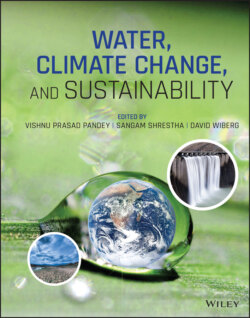Читать книгу Water, Climate Change, and Sustainability - Группа авторов - Страница 49
3.5. ASSESSING SUSTAINABILITY OF WATER AND ENERGY IN BIO‐BASED SYSTEMS
ОглавлениеObjectively assessing the sustainability of bio‐based systems requires reliable metrics that accurately depict the particularities and complexities of these systems. Reliable assessment tools allow a fair analysis of the bio‐based processes and the comparison with other bioprocesses and non‐bioprocesses, and provide information for strategic decision‐making. Bio‐based systems are expected to be environment‐friendly. However, accurate assessments are necessary to avoid resource overexploitation or unexpected water/energy overuse due to land use change (Martin et al., 2018).
To allow comparison between different systems, standard tools and indicators are required. However, this standardization is yet to be achieved for the bio‐based systems (Bosch et al., 2015). Thus, there is a variety of tools and indicators that can be used for assessing the sustainability of bio‐based systems, including metrics designed originally for other systems, such as chemical processes. Most of the sustainability assessment tools include indicators related to energy use, but very few assess water use directly (Broeren et al., 2017). Even more infrequent are the metrics that evaluate the water–energy nexus. Indicators used to assess the sustainable use of water and energy in bio‐based systems could be classified into the sustainability triple bottom line categories from environmental, economic, and social perspectives. Combining the indicators from all three categories is important to achieve a fair assessment of the sustainability of bio‐based systems; however, most of the tools fail to include all of them (Martin et al., 2018). Most of the metrics used for bio‐based systems focus on efficient resource utilization.
Table 3.4 Selected indicators for water and energy use.*
| Indicators | Unit | Definition |
|---|---|---|
| Water use | ||
| Total water use | m3 | Total water used by a process |
| Water productivity (WP) | kg/m3 or kg/kg | |
| Water intensity (WI) | m3/$ | |
| Fractional water consumption (FWC) | m3/kg | |
| Specific liquid waste | m3/kg | |
| Energy use | ||
| Total energy use | kJ/h | Total energy consumed by a process |
| Energy efficiency (ηE) | kJ/kJ | |
| Energy intensity (REI) | kJ/$ | |
| Specific energy intensity (RSEI) | kJ/kg | |
| Renewable energy index (RIE) | kJ/kJ | |
| Water–energy nexus | ||
| Water and energy productivity | kg/m3∙kJ | |
| Water energy ratio | kJ/kJ |
* Adapted from Ruiz‐Mercado et al., 2012 and Khan et al., 2009.
